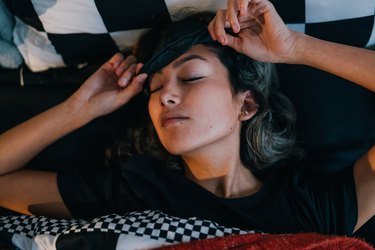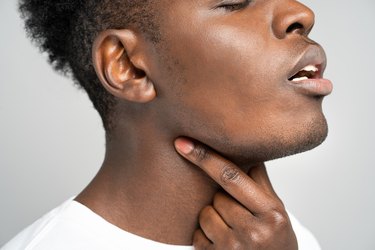
If you've ever woken up with a dry mouth, bad breath or a throat that feels like sandpaper, you might be breathing through your mouth at night — and it's not doing you any favors.
Enter mouth taping, the buzzy sleep hack that claims to help you breathe better, snore less and wake up feeling more refreshed. It might sound strange, but there's some real science behind the benefits of nasal breathing and why keeping your mouth shut while you snooze could be a game-changer.
Video of the Day
Video of the Day
Curious? Let's break it down.
What Is Mouth Taping?
Mouth taping is the practice of taping your mouth shut before bed to encourage nose breathing while you sleep. The idea is simple: By keeping your lips sealed, you force yourself to breathe through your nose, which can help prevent the potential negative effects of mouth breathing.
To try it, you use a porous, skin-safe tape placed over both your upper and lower lips, making it difficult to open your mouth. Think of it as a gentle nudge to keep your breathing on track during the night.
This technique is especially popular among people who habitually breathe through their mouths while sleeping and are looking for a way to shift to nasal-breathing habits.
Why Is Nasal Breathing Better?
The whole point of mouth taping is to help you breathe through your nose. So what's the big deal about nasal breathing? Turns out, it's not just a wellness trend — there's science behind it.
Breathing through your nose is better for you than mouth breathing because your nose acts as a natural filter. It humidifies, warms and cleans the air you inhale; produces nitric oxide (which helps with circulation) and regulates airflow, says Marina Gonchar, DMD, orthodontist and founder of Skin to Smile. These features can support your immune system, oral health and jaw structure, and they may even lead to better sleep, Dr. Gonchar says.
On the flip side, chronic mouth breathing can dry out your mouth, cause bad breath, contribute to gum disease, weaken your immune response and even change your facial structure over time, Dr. Gonchar says,
Potential Benefits of Mouth Taping
While research is still emerging, mouth taping seems to have a lot of potential. Here are just a few ways it may benefit your health and sleep.
1. May Reduce Snoring
If snoring is caused by air turbulence in the mouth and throat, mouth taping can help by directing airflow through your nose instead. This can create smoother air movement and reduce vibrations that cause snoring, Dr. Gonchar says. Nasal breathing also helps maintain airway pressure, which can interrupt snoring patterns, she says.
However, if your snoring stems from structural issues like enlarged tonsils or nasal obstructions, mouth taping won't fix the problem, Dr. Gonchar says.
2. May Prevent Dry Mouth
Saliva production drops at night, and mouth breathing can worsen dryness, leading to bad breath, gum inflammation and a higher risk of cavities, Dr. Gonchar says. Mouth taping helps keep your lips closed, preventing saliva from evaporating and keeping your mouth moist, she says.
Can Mouth Taping Help With Obstructive Sleep Apnea (OSA)?
OSA is a serious sleep disorder where breathing stops and starts repeatedly due to throat muscles relaxing and blocking the airway. Symptoms often include snoring, but while mouth taping can sometimes reduce mild snoring, it's not a primary treatment for moderate to severe OSA, Dr. Gonchar says.
Why not? For people with OSA, proper treatment like a continuous positive airway pressure (CPAP) machine is crucial. CPAP delivers steady air pressure to keep your airways open, something mouth taping simply can't do.
Untreated, OSA is linked to a greater risk of lower oxygen levels and developing conditions like high blood pressure, heart rhythm issues and heart disease, per the Mayo Clinic. So getting the right treatment is critical.
That said, some preliminary studies suggest mouth taping may help in mild OSA cases. A small February 2015 study in Otolaryngology-Head and Neck Surgery found that porous tape reduced snoring and apneas (complete or partial pauses in breathing) for folks with mild OSA who breathe through their mouths. Similarly, another small September 2022 study in Healthcare (Basel) reported improvements in snoring and OSA severity in mild cases.
Still, research is limited. More studies are needed to determine whether mouth taping is an effective, safe intervention for people with mild OSA. In the meantime, experts stress that mouth taping for OSA should be explored cautiously and only under medical guidance.
Potential Risks of Mouth Taping
While it may have its benefits, mouth taping isn't without potential downsides. Potential side effects include the following, according to Dr. Gonchar and the Sleep Foundation:
- Difficulty breathing
- Poor sleep quality due to discomfort or difficulty breathing through the nose
- Brain fog
- Skin irritation or allergic reactions from the tape
- Anxiety from having your mouth taped shut
- Pain from removing the tape (especially for those with facial hair)
For those with nasal issues like congestion, allergies, structural problems (e.g., deviated septum) and undiagnosed OSA, mouth taping may come with even more serious risks as it can worsen airflow and oxygenation, Dr. Gonchar says.
Case in point: An October 2024 study in JAMA Otolaryngology-Head & Neck Surgery found that closing the mouth in OSA patients with velopharyngeal obstruction (a blockage or narrowing of the sphincter between your oral and nasal cavities) can actually reduce airflow further.
Who Should Avoid Mouth Taping?
Mouth taping isn’t safe for everyone. Dr. Gonchar recommends avoiding it if:
- You have diagnosed sleep apnea. This condition requires specialized treatment, and mouth taping could worsen symptoms.
- You have structural nasal issues like a deviated septum.
- You experience allergies, sinus infections, congestion or nasal obstructions (like polyps) that impair nasal breathing.
How to Mouth Tape Safely
If you're thinking about trying mouth taping, start with these essential safety tips to ensure a smooth (and breathable) experience.
1. Make Sure You Can Breathe Through Your Nose
Before taping, check that your nasal passages are clear, Dr. Gonchar says. If you breathe easily through your nose while lying down and don't experience symptoms like loud snoring, gasping or morning headaches (all signs of sleep apnea), you might be a good candidate.
Still, it's smart to consult your doctor first. They can check for undiagnosed issues like nasal obstructions, a deviated septum or even mild OSA, which can lower oxygen levels during sleep.
2. Choose Skin-Safe Tape
Not all tape is created equal. Opt for hypoallergenic, porous tape designed for skin to avoid irritation or allergic reactions, Dr. Gonchar says. Surgical tape, athletic tape or adhesive strips are all good options. Some companies even sell special tape specifically made for mouth taping during sleep
Never use household tape (like masking tape, duct tape or Scotch tape) — these can damage your skin and aren't breathable, according to the Sleep Foundation. Improper tapes also could fall off during the night an potentially become a choking hazard.
3. Start Small
For your first attempt, don't go full coverage. Cut a small strip of tape and apply it vertically or in an X-pattern, leaving some room for air circulation through your mouth, Dr. Gonchar says.
Introduce mouth taping gradually:
- Start with short, daytime trials to test your comfort level.
- Move on to naps.
- Finally, try it overnight once you're confident.
If you notice any difficulty breathing through your nose due to allergies or nasal blockages, skip mouth taping altogether.
4. Prep Your Skin
Clean and dry your lips before applying the tape to help it stick better, Dr. Gonchar says. To reduce irritation and sticky residue, you can apply a thin layer of food-safe gel or oil around your mouth, according to the Sleep Foundation.
For easy removal in the morning, fold over one corner of the tape when applying it, per the Sleep Foundation. This small step can save you from unnecessary tugging and discomfort.
Warning
Never apply mouth tape to another person. It must be done consciously and only to yourself.
Never use mouth tape on children.
Use only tape products suitable for this purpose.
Alternatives to Mouth Taping
If you're curious about mouth taping but hesitant to try it, there are plenty of other options to explore, depending on your goal.
1. Try Other Products to Encourage Nasal Breathing
Want to breathe better through your nose? Dr. Gonchar recommends the following:
- Nasal strips: Adhesive strips placed on the nose can help open nasal passages, encouraging nose breathing. Research on their effectiveness for snoring is mixed, but they're easy to try.
- Saline sprays: Clearing congestion with a saline spray can make nasal breathing easier.
- Humidifiers: Keeping the air moist helps reduce nasal dryness and improves airflow.
2. Explore Other Ways to Reduce Snoring
Dr. Gonchar says these simple, effective solutions can reduce snoring for both snorers with and without sleep apnea.
Side sleeping: Sleeping on your side instead of your back can expand your airway, reducing snoring and mouth breathing.
Oral appliances: Custom dental devices can adjust the position of your jaw and tongue, improving airflow and overall sleep quality. Ask your dentist if one of these appliances is right for you.
3. Up Your Oral Hygiene Routine
If mouth breathing at night is giving you dragon breath, good oral hygiene is essential. A solid oral care routine, including brushing, flossing, tongue cleaning and mouthwash, is a proven way to combat bad breath — no tape required.
4. Prioritize Sleep Hygiene
Healthy sleep habits can help improve your rest without relying on mouth taping. Try these tips for better shut-eye:
- Stick to a consistent sleep schedule.
- Create a cool, dark, quiet sleeping environment.
- Avoid screens, alcohol and caffeine before bed.
- Exercise regularly.
When to See a Doctor
Mouth taping isn't a cure-all solution, especially if you're a chronic mouth-breather. An underlying health issue may be to blame, so professional advice is key. Here's when to consult a doctor:
1. If You Suspect You Have a Sleep Disorder
Mouth taping won't fix conditions like OSA, which require medical diagnosis and treatment, Dr. Gonchar says.
Symptoms of OSA include the following, per the Mayo Clinic:
- Loud snoring
- Gasping or choking during sleep
- Morning headaches or dry mouth
- Excessive daytime sleepiness or trouble focusing
- High blood pressure or mood changes
Ignoring OSA symptoms and relying on mouth taping could delay essential treatment. Unchecked, OSA can increase your risk of heart problems like heart disease or stroke.
2. If You Have Persistent Bad Breath
Severe bad breath could signal something more serious, such as the following, per the Sleep Foundation:
- Cavities or gum disease
- Sinus infections
- Digestive issues like ulcers
If bad breath persists despite good oral hygiene, visit your doctor or dentist to identify and address the root cause.
3. If You Have Other Underlying Issues
If you're struggling to breath at night, other medical issues may be at play. It's important to get checked out to tackle root causes of breathing problems like a deviated septum or allergies, Dr. Gonchar says.
The Bottom Line
If you're considering mouth taping, make sure it's appropriate for your situation. For some, it may be a game-changer; for others, it can pose real risks.
"Mouth taping is not a substitute for addressing underlying conditions like sleep apnea, nasal obstructions or chronic mouth-breathing habits," Dr. Gonchar says.
Always consult a health care provider before trying it, especially if you have existing sleep or breathing issues.
- Healthcare (Basel): “The Impact of Mouth-Taping in Mouth-Breathers with Mild Obstructive Sleep Apnea: A Preliminary Study”
- Otolaryngology Head and Neck Surgery: “Novel porous oral patches for patients with mild obstructive sleep apnea and mouth breathing: a pilot study”
- The Sleep Foundation: “Mouth Taping for Sleep: Does It Work?”
- JAMA Otolaryngology-Head & Neck Surgery: “Mouth Closure and Airflow in Patients With Obstructive Sleep Apnea: A Nonrandomized Clinical Trial”
- Mayo Clinic: “Obstructive sleep apnea”
Is this an emergency? If you are experiencing serious medical symptoms, please see the National Library of Medicine’s list of signs you need emergency medical attention or call 911.


